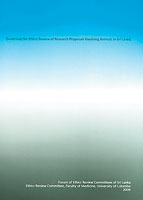It was a scandal that rocked the very foundations of essential research in Sri Lanka a few years ago. Newspaper headlines screamed that animals brought for research to a well-known university had been ill-treated.
Animals have been used for research not only in Sri Lanka but all over the world for the benefit of humankind – be it to develop vaccines, test medicines or study their anatomy.
Many are the countries that have developed humane guidelines in dealing with animal research because the underlying factor is that these “research subjects”, unlike humans, cannot give their consent.
Last Monday, this country reached a milestone with regard to animal research when a booklet on the ‘Guidelines for Ethics Review of Research Proposals Involving Animals in Sri Lanka’, was launched at a simple ceremony held at the Colombo Medical Faculty presided over by the Vice Chancellor of the University of Colombo, Prof. Kshanika Hirimburegama, the Dean of the Medical Faculty, Prof. Harsha Seneviratne and the faculty’s Ethics Review Committee Chairman Prof. Hemantha Senanayake.
The guidelines have been compiled by the Forum of Ethics Review Committees of Sri Lanka and the Ethics Review Committee (ERC) of the Colombo Medical Faculty after several sessions of consultations with a wide and varied group including academics from all universities across the country, government officials and animal welfare groups. The booklet has been sponsored by the World Health Organization.
The need for such guidelines was felt acutely when the National Bioethics Committee (NBC) of the National Science Foundation realized in 2003 that there was no legislation or nationally applicable codes of practice to ensure the humane treatment of animals used in research, states well-known animal lover, Dr. Malik Fernando in his ‘Background’ note.
A desperate search turned up only the ‘Ethical obligations when using laboratory animals’ set out by the Medical Research Institute (MRI) in its guide for researchers. It was then that the NBC recommended the setting up of Animal Ethics Committees (AECs) by universities and research institutes, states Dr. Fernando an active member of the ERC.
In 2005, the University Grants Commission requested the Vice Chancellor of the Peradeniya University, through the Director, Council for Agricultural Research Policy, to set up such committees and in 2007 such a committee saw the light of day at the Faculty of Veterinary Medicine and Animal Science, according to him.
But is it only veterinarians who use animals in research?
With the answer being no and scientists in many disciplines including zoologists, medical doctors, biochemists, pharmacologists etc being on the list, a comprehensive set of guidelines was needed.
Sadly, a huge problem the country is facing today is that it has no laws to impose ethical guidelines, the Sunday Times understands.
 |
| The new booklet |
This is what prompted the publication of the guidelines, at least as a first step in ensuring the humane treatment of animals used in research.
These guidelines have been compiled and edited by ERC Joint Secretary Dr. Vajira H.W. Dissanayake, ERC members Dr. Mangala Gunatilake and Dr. Thurayratnam Chenthuran and Research Assistant N.M. Madhubashini Jayamanne.
Stressing that no study should be granted ethics approval unless issues such as: Why is it that the research cannot be carried out with non-animal alternatives? Why is it necessary to use this particular species of animal? and Is the lowest number of animals required being used? and dealt with, the guidelines focus on a range of topics.
They include the crucial aspects of pain and discomfort in experimental procedure, surgery and anaesthesia, animal houses and research environment, acquisition of animals – laws and right, post research procedures, transportation of animals, euthanasia, field research and animals used for routine diagnostic work and vaccine production.
Here are a few important
clauses:
- The research team personnel must treat the animals with kindness, respect and great care, understanding that the animals have sufficient organization to have their own basic drives, desires and intentions and by the research we interfere with their effort to fulfil their destinies.
- The study must be conducted in a manner which would avoid discomfort, pain, illness and trauma to animals. If this is unavoidable, the discomfort and pain must be minimized with the assumption that procedures that would produce pain in humans will also do so in other animals.
- Any surgical procedures on and anaesthetization of large animals should be conducted only by a veterinarian.
l All animals which are not bred in the same animal house/facility must be acquired lawfully. Sourcing and identification of animals must be transparent. Stray, feral (those that have escaped domestication and returned partly or wholly to their wild state) or animals from shelters or pounds may be used only with justification and ERC/AEC approval.
- Field research should not disturb human or animal populations, sensitive ecosystems and normal interactions between populations in the community.
With this set of guidelines, which should be adhered to voluntarily, Sri Lanka has turned a new leaf in its attitude towards animals used in research, laying down in print and concretizing what may have been practised.
They show the right path and hopefully institutions dealing in animal research will encourage and persuade their employees to take them into consideration, thus preventing any misdemeanours. |



